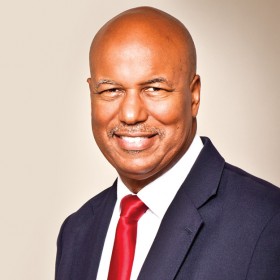Finance Minister Attends Meetings In Brussels
 Minister of Finance Bob Richards yesterday [June 5] concluded meetings with various agencies and departments in Brussels held on 4th – 5th June, 2013 to discuss matters related to financial services, tax, and audit.
Minister of Finance Bob Richards yesterday [June 5] concluded meetings with various agencies and departments in Brussels held on 4th – 5th June, 2013 to discuss matters related to financial services, tax, and audit.
The Minister met with representatives within the EU Commission, the UK Permanent Representation and the EU Parliament to discuss matters of common interest. The Minister was joined by Brussels based Counsel to the Government of Bermuda.
“Stakeholders at home and abroad want evidence that the Government is doing what it says,” said the Minister. “The meetings directly support our commitment to the financial services sector.”
A spokesperson said, “The Ministry is committed to helping Bermuda’s financial institutions succeed in Europe. The starting point is a clear understanding of the current reality. Bermuda is ranked in the top 10% of regulators according to the World Bank’s Governance Indicator Report.
“In addition, financial activity between Bermuda and Europe grew from $212 billion in 2000 to just under $740 billion in 2011, according to the 2012 Bermuda in the World Economy Report.
“Bermuda companies write 27% of the broker-placed European reinsurance and are expected ultimately to pay 62% of the claims of the UK’s largest peacetime fire and explosion- the Buncefield oil terminal fires of 2005.
The Minister also attended the Association of Bermuda Insurers and Reinsurers 6th Annual International Insurance Regulatory Issues Dialogue held in Brussels on the 4th June where he met with other representatives of the EU Commission, members of the Bermuda insurance market.
Minister Richards said: “The broader environment in which business operates has been altered. In Bermuda, financial institutions are the most directly affected by the changes in external regulatory policy. This is especially true in areas such as insurance, asset management, banking, and trust business. The trip is part of a broader effort to build goodwill and confidence in Bermuda.”


“Who let the dogs out…WOOOF,WOOOF,WOOOF!” Looking good Mr. Richards. Get those ducks in a row for that meeting with Cameron!!!This G8 is gonna have some fast balls coming!!!!
Oh daddy would be so proud of his little boy all grown up.
Mr. Richards, after you finish your G8 you need to get back to getting these 2000 jobs. I have family members that need employment.
. The starting point is a clear understanding of the current reality. Bermuda is ranked in the top 10% of regulators according to the World Bank’s Governance Indicator Report.
“In addition, financial activity between Bermuda and Europe grew from $212 billion in 2000 to just under $740 billion in 2011, according to the 2012 Bermuda in the World Economy Report.
hmmmmmmmmmm so this was under the leadership of the PLP and we are in good standings with these people then why all the negativity about the PLP done us soo bad but the Minister quotes success that the PLP made …..no one else sees this??
The work of the BMA and the growth of the Reinsurance market post 911 and Hurricane Katrina have very little to do with the PLP. But the immigration policies of Col Burch, the National Debt level and the overspending / growth within the civil service to unsustainable levels were a direct result of the PLP Government. – two very different situations.
In a nutshell: An international company can put their capital base in Bermuda but they can hire as few people as possible if they need to. So when immigration started to affect their ability to retain intellectual capital on the Island they simply trimmed companies down to minimal levels in order to still take advantage of the regulatory and market environment but hire as few people here as possible. Which for Bermuda translates to less $$$ in our local economy.
But you can try your best to spin what you don’t understand, the previous Government were very good at it.
No matter who was in power at the time…it would have still grown!
It is true that the dollar amount of business passing through Bermuda (insurance premiums mostly) has increased hugely over the last ten years or more, but this does not contribute directly to Bermuda’s wealth. If the premiums were taxed, even at a very small amount, then Bermuda would benefit, but they are not. Also, increased dollar amounts of business does not always mean increased profits. Profit margins are continually being squeezed, and businesses need to be more competitive to stay in business.
Only the indirect wealth generated by employing staff in Bermuda is of value to Bermuda, plus of course any corporate fees, generous donations made by the companies themselves, people to visit Bermuda in order to do business with IB, or to visit employees of IB. Obviously Bermudians employed by these companies benefit directly, and Bermuda also benefits from non-Bermudians and Bermudians employed who spend monies earned in Bermuda.
Unfortunately for Bermuda, the value of the finance industry can continue to increase hugely but with much fewer staff working in Bermuda.
This is the dilemma faced by any Bermuda government – how to extract value from the IB in order to maintain and improve the Bermuda’s infrastructure without upsetting the IB sector enough that they chose to move elsewhere.